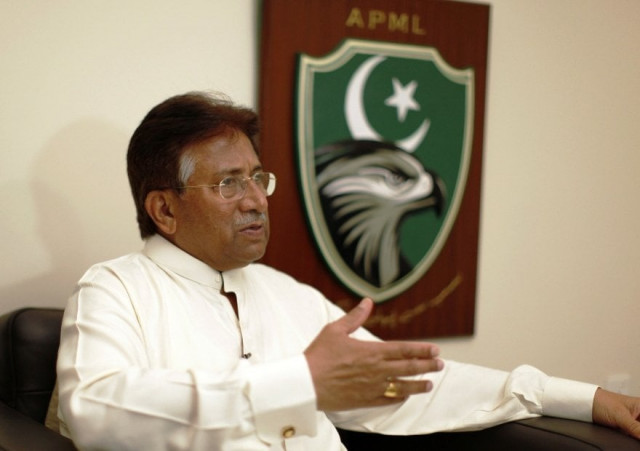Musharraf treason case: All eyes trained on Feb 18 hearing
Ex-president must appear in court despite unsolved jurisdiction issue.

General (retd) Pervez Musharraf. PHOTO: REUTERS
The special court constituted to try General (retd) Pervez Musharraf for high treason observed on Wednesday that despite the unanswered question of the court’s jurisdiction, the former general must appear before the bench as ordered on February 18.
The court adjourned the hearing till February 18, with an observation that the accused has already been directed to appear in court on the same date.
Musharraf’s legal team believes that charges will not be framed against their client if he appears before the bench next week, as the three-judge bench headed by Justice Faisal Arab had assured them that the accused can seek adjournment until a decision on the court’s jurisdiction is made.
“This is a tricky situation,” a member of the defence team said, adding, “There is a written order of the special court that charges will be framed on the appearance of the accused.”
The court has no right to review its own orders, he added. “We will see how to respond despite a verbal commitment,” the senior defence lawyer said.

A member of the prosecution team told The Express Tribune that the commitment made by the defence counsel that Musharraf will appear next week has also been incorporated in the written order of the special court. “It is no longer a verbal commitment now,” he said.
If Musharraf prefers not to appear, the court can order for his immediate arrest, he believes.
During Wednesday’s hearing, prosecutor Akram Sheikh, while concluding his arguments on the army act, requested that the court regulate the custody of the accused.
“Despite the lapse of two months, the custody of the accused could not be regulated,” he added. Justice Arab said the court will consider this request.
Sheikh argued that this law of high treason came much later than the Pakistan Army Act 1952. It was first included in the 1973 constitution with a purpose behind it. “We lost half of the country in 1971 and such a necessity emerged that when a gun was handed over to a soldier it is necessary to take oath from him that he will not take part in politics.”
“This is an exclusive offence for the special court and this is an exclusive court for this offence,” Sheikh said. While referring to section 549 of the Pakistan Penal Code, Sheikh said this section is not applicable to the present proceedings as it is inconsistent with section 3(2) of the Criminal Law Amendment (Special Court) Act, 1976.
“CrPC has to give way to special law which deals with this issue.”
Opposing the defence team’s request to transfer this court to a military court, Sheikh said that the federal government has constituted this court under special law to hear a constitutional offence, not a theft case. “This is a court of exclusive jurisdiction,” he said.
Khalid Ranjha, the counsel for Musharraf, said that the points raised by the prosecutor were not part of his written reply and he sought time from the court for rebuttal. At the outset of the hearing, Rana Ijaz, a member of Musharraf’s legal team, addressed the court and said that he was law minister when Musharraf imposed emergency, therefore, being an abettor he should be arrested from the court immediately. However, the court observed that his case was not before the court.
Ijaz has also taken back a written application through which he had earlier sought protection of the court from the prosecutor. “No need to be pessimistic and apologetic in this case,” he said, when other members of his team objected to this move.
Ahmad Raza Kasuri asked the court to decide first the appointment of the prosecutor and then let him address the court. But the court said it will decide all applications once the arguments are concluded.
Published in The Express Tribune, February 13th, 2014.



















COMMENTS
Comments are moderated and generally will be posted if they are on-topic and not abusive.
For more information, please see our Comments FAQ